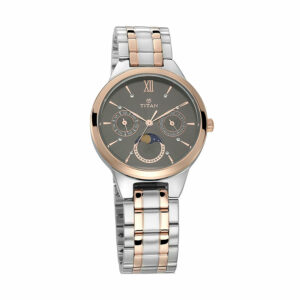BY OWNING a Titan timepiece, what you’re looking at is just one of the products that the Tata Group produces, a veritable giant that casts a long shadow across India.
Kuruvilla Markose, chief executive officer – International Business, for Titan Company Limited, discussed the hold that Tata has over India, in an interview with BusinessWorld on Nov. 8. “Sometimes, we call it a software to salt-kind of group,” he said. Through various subsidiaries, Tata owns India’s largest software company, sells industrial chemicals, but also tea (among other food products), and cosmetics. Through Tata Motors, it owns the Jaguar and Land Rover brands. Another unit, the one under which Titan belongs to, has interests in jewelry, watches, and eyewear. The Tata Group was founded by Jamsetji Tata in 1868.
“Fundamentally, one common thread that runs across us, the Tata Group is known for its professional practices, and also for consumer trust,” said Mr. Markose. “If you ask any consumer in India what Tata stands for, they’ll state that it stands for trust.”
Titan is the world’s fifth largest watch manufacturer, behind rivals in East Asia and Switzerland. Still, No. 5 is a big number: Mr. Markose said that they’ll end the year with 20 million watches manufactured and sold. “The reason why we are No. 5 is because we serve the Indian market. India today is now the world’s most populous country. It’s a huge market. It’s continuing to grow and from a per capita income perspective, and from an economy growth perspective, it’s the fastest-growing economy in the world.” In their home base, they have a 50% market share, and the watches are made across India.
The name does not come from the primordial giants of Greek myth. Titan’s name comes from the giants of Tata, as well as the Tamil government, operating as a private-public partnership since 1984. “Back in the ’80s, India was a regulated economy. Watches in India were a reserved sector. It was reserved for either the small-scale sector… or you had to be a government company. Only then can you enter and start the watch business,” he explained.
“We are not a high-end luxury brand. We are a brand for the people,” said Mr. Markose when asked about celebrities who wear their watches, within India and out. So who wears their watches? “Everybody.”
That’s not an exaggeration: their clientele ranges from first-jobbers to wealthy Emirati. The watches are present in 25 countries, including the Gulf nations, South Asia, Southeast Asia, Australia, and New Zealand, and are available online in the US and Europe.
The reason is in their pricing. In the Philippines, they’ve been distributed for about 10 years by Newtrends International Corp. (NIC), and are available at Watch Republic Shops, SM and Robinsons stores, and other department stores. There, they cost about P2,995, and a little bit higher. But they have another line that also ranges from 2,000 to 3,000 — dollars, that is. That’s the Nebula line, made completely of solid gold.
The company continues to make analog watches in an increasingly smart world, but then, Mr. Markose says, “Any watch is an expression of your personality. For men, there aren’t too many accessories that you have, and not all men are comfortable wearing jewelry.
“Using the watch to tell other people about you: just like your clothes, your hairstyle… is a wonderful way of letting other people know what you are like as a person,” he said. While smart watches can do things no analog watch can do (such as tracking your heart rate), “I’ll use a smart for functionality… but when I’m at work, or when I’m going to a party, I don’t want to wear a smart watch. I want to wear something nicer and more aligned to my personality… I don’t need to see my e-mail all the time,” he said.
That said, they’re introducing their own line of smart watches to the Philippines in about a month.
As mentioned earlier, their main rivals in the watch business are in East Asia and Switzerland. Aside from belonging to a giant like Tata, Titan has the whole of India backing up their rise across the charts. That’s not hyperbole: Mr. Markose talks about postwar manufacturing capabilities in Asia. “In the ’60s and ’70s, the Japanese sort of became a force to reckon with globally,” he said, talking about their cars, and their appliances, and their other goods. Korea followed, then China. “I believe that in the next 15 years, it’s going to be the time for Indian brands and Indian businesses.”
When watches were first invented, they were only in the hands of a few, ensuring that what they offered — the gift of knowing time, and thus, the movement of the world — were in their hands alone. That made timepieces a status symbol. With prices at P2,995, Titan’s watches are accessible to almost everyone.
“Feeling good is an important aspect of our existence as people. We all want to feel good about our jobs, our families, what we do. How we live. In a lot of ways, that expression of how you feel and the confidence that you get is in your appearance. That’s what we’ve tried to do, by giving people timepieces that make them feel good,” said Mr. Markose. — Joseph L. Garcia

